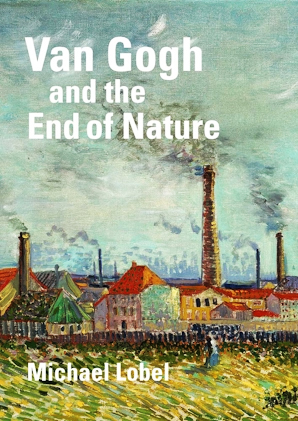'반 고흐와 자연의 종말(Van Gogh and the End of Nature)' 출간
빈센트 반 고흐(1853-1890)의 작품을 산업시대를 배경으로 분석한 미술비평서 '반 고흐와 자연의 종말(Van Gogh and the End of Nature)'이 예일대에서 출간됐다. 헌터대와 CUNY대 마이클 로벨(Michael Lobel) 교수가 쓴 이 책은 반 고흐가 그림에서 공장, 오염된 하늘, 탄광 등을 묘사하면서 산업시대 폐기물과 오염을 어떻게 활용했으며, 기후변화와 생태파괴 위협을 경고했는지를 조명했다. 저자는 Air/ Earth/ Fire/ Water/ Color의 챕터로 나누어 분석했다.
*빈센트 반고흐의 전설을 만든 요한나 반고흐-봉허 이야기
*빈센트 반 고흐와 세자매: 안나, 엘리자베스, 빌레미나
*반 고흐는 왜 사이프러스 나무에 집착했을까? 메트뮤지엄 특별전 'Van Gogh's Cypresses', 2023
*빈센트 반 고흐: 아이리스와 장미@메트뮤지엄, 2015
*뉴욕영화제 2018 화가 줄리안 슈나벨의 '영원의 문에서(At Eternity's Gate' ★★★☆
*위대한 음식 열정 <9> 빈센트 반 고흐: 감자와 커피

Van Gogh and the End of Nature
by Michael Lobel
A groundbreaking reassessment that foregrounds Van Gogh’s profound engagement with the industrial age while making his work newly relevant for our world today
Vincent van Gogh (1853–1890) is most often portrayed as the consummate painter of nature whose work gained its strength from his direct encounters with the unspoiled landscape. Michael Lobel upends this commonplace view by showing how Van Gogh’s pictures are inseparable from the modern industrial era in which the artist lived—from its factories and polluted skies to its coal mines and gasworks—and how his art drew upon waste and pollution for its subjects and even for the very materials out of which it was made. Lobel underscores how Van Gogh’s engagement with the environmental realities of his time provides repeated forewarnings of the threats of climate change and ecological destruction we face today.
Van Gogh and the End of Nature offers a radical revisioning of nearly the full span of the artist’s career, considering Van Gogh’s artistic process, his choice of materials, and some of his most beloved and iconic pictures. Merging a timely sense of environmental urgency with bold new readings of the work of one of the world’s most acclaimed artists, this book weaves together detailed historical research and perceptive analysis into an illuminating portrait of an artist and his changing world.
Michael Lobel is professor of art history at Hunter College and the Graduate Center, CUNY. His previous book, John Sloan: Drawing on Illustration, was awarded the Smithsonian American Art Museum’s Charles C. Eldredge Prize for Distinguished Scholarship in American Art.
“Intriguing. . . . Taking what is now a topical approach, [Lobel] regards Van Gogh as warning of ‘threats of climate change and ecological destruction.’”—Martin Bailey, Art Newspaper
“[A] revealing study. . . . The fine-grained analysis and lively prose delight. Art history buffs will want to add this to their bookshelves.”—Publishers Weekly
“Spirited. . . . Lobel’s conversational tone dodges academic jargon, immediate and inviting as Van Gogh’s rich surfaces. He’s a witty guide and sworn enemy of clichés about the artist. . . . Van Gogh and the End of Nature balances somber themes with a buoyant love of the artist’s drawings and pigments.”—Hamilton Cain, On the Seawall
“In this remarkable book, Michael Lobel makes a stunning contribution to our understanding of Van Gogh, an artist seemingly so familiar as to be beyond revision. Writing with refreshing lucidity and engaging humor, Lobel substantially reframes this iconic figure of postimpressionist art by revealing—in work after work—an entire realm of environmental observation hitherto largely unnoticed by scholars.” —Susan Sidlauskas, Rutgers University
“Michael Lobel’s superb, richly illustrated book shifts Van Gogh studies in a new, far more interesting direction. Van Gogh and the End of Nature should inspire a reinvestigation of the industrial complexities that made modernism possible.” —Alan C. Braddock, author of Implication: An Ecocritical Dictionary for Art History
“To situate Van Gogh, the celebrated ‘painter of nature,’ as a witness, a critic, and at the same time an aesthete of the industrial despoliation of nature that inevitably marked the age of coal everywhere is a stunning achievement. Michael Lobel’s elegant—and cogently argued—book will fundamentally change our view of this important artist and greatly advance the conversation already underway between art history and the environmental humanities. A must-read for anyone interested in that conversation.” —Dipesh Chakrabarty, author of The Climate of History in a Planetary Age
“Van Gogh worked at the dawn of a modernity marked by a shift in the relative dominance of the natural and the manmade. Lobel’s exploration of this relationship in Van Gogh’s art is fascinating!” —Bill McKibben, author of The End of Nature
https://yalebooks.yale.edu/book/9780300274363/van-gogh-and-the-end-of-nature




 바이올린 듀오 스트링 노이즈(String Noise, 폴린 김+콘라드 해리...
바이올린 듀오 스트링 노이즈(String Noise, 폴린 김+콘라드 해리...
 MoMA 무성영화 주간(Silent Movie Week, 7/31-8/6)
MoMA 무성영화 주간(Silent Movie Week, 7/31-8/6)

